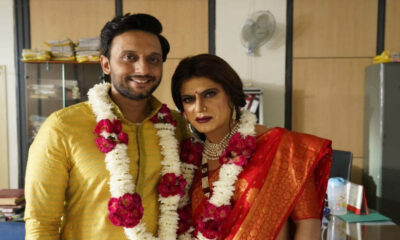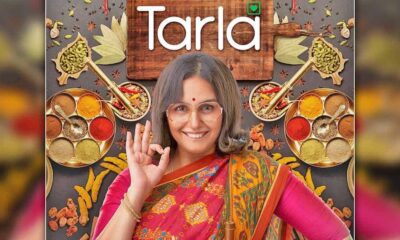Bollywood News
The Married WomanReview: A Faintly Appreciable Tale Of Two Women & A Relationship

The Married Woman (AltBalaji/Zee 5)
Starring Riddhi Dogra, Monica Dogra, Imaad Shah
Directed by Sahir Raza
Rating: ** ½
This could have been a lot more than what it finally is. A mirror of a middleclass marriage where there is no grief. Just a numbness after years of togetherness. Given the inert state of her libido, it is no surprise that Astha(Riddhi Dogra, easy on the eyes) subconsciously begins searching for fulfillment outside marriage.
Enter the charismatic Aijaaz(played well by Imaad Shah). Aijaaz is everything that Astha’s Husband Hemant is not. Passionate, dedicated, empathetic and intellectual. It’s easy for Astha to be drawn to Aijaaz. In an important sequence which turns surprisingly listless and limp,she makes a complete fool of herself confessing her feelings towards him .
The problem is, Astha’s feelings are constantly offset in the oscillating plot by characters who offer her chance to be everything she is not. First it’s Aijaaz then when he killed suddenly, Aijaaz’s freespirited bohemian wife Peeplika(Monica Dogra) who is shown to have some really strange ways of dealing with grief and bereavement.
While the characters’ unconventional moves were shocking in Manju Kapur’s novel they just don’t fit into the visual interpretations offered by director Sahir Raza which veers between the prosaic and the bland. The themes ranging from lesbianism to the Babri Masjid unrest to Love Jihad, are explosive and I can see the moral police rubbing their hands in glee.
They can spare themselves the effort. The Married Woman is just not important enough to elicit anything more than a vague smile from the audience. It is ambitious but shallow, sprawling in canvas but blissfully unaware of how to stage-manage the torrent of drama that defines the subject and characters and makes them potentially eligible for something far more vital than what the content and execution are able to provide.
Even the most unconventional moments in the story are defined conventionally. When Peeplika finally seduces Astha into a kiss the song playing in the background is the Lata Mangeshkar classic Lag jaa gale se. When the firebrand Aijaaz filled with an unharnessed passion, lectures Astha on the religious divide, he sounds like a stale re-run of a spiritual channel. When Astha’s husband Hemant proposes sex every second Saturday of the month he is just being that stereotypical wimp on the web that all women-centric content throws in our face.
In fact one of the series’ few interesting scenes is the one where Astha suggests some excitement in their routine sex life(reminding us of the wife suggesting “foreplay” in The Great Indian Kitchen). The alarmed anxious response of the husband(Suhaas Ahuja) is priceless. Sadly the moments of surprise and delight in The Married Woman are far too infrequent. Most of the incidents seem designed to shock us. They do no such thing. They simply bore us.








